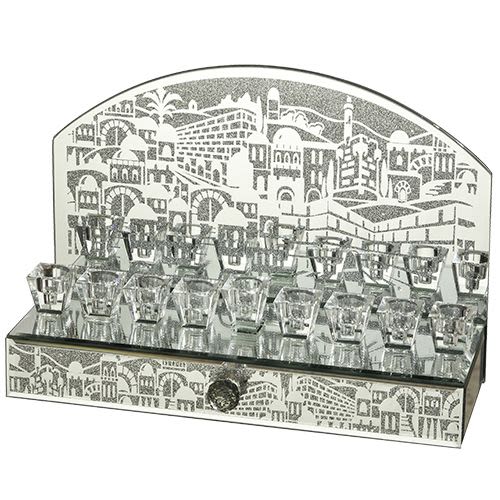
If I Only Knew
The greatest wisdom is to understand at what point we are far from Wisdom and yet to still yearn for Wisdom...

The greatest wisdom is to understand at what point we are far from Wisdom and yet to still yearn for Wisdom.
Years ago, a movement commenced among the young people in the United States, and later on, all around the world. By the hundreds they flocked to the doors of the spiritual centers. Left high and dry by the failure of materialism and the instability of the system to give them a program worthy of their deep aspirations, the young people began to search for higher truths. A large number succeeded in effecting a deep metamorphosis.
One day a youth entered a Chassidic center, looking for inspiration. He found an old man busy putting books away, and who seemed disposed to talk to him. After an exchange of a few kindly words, the old man manifested a wish to help the hippie in his own way, even though communication between the two men was reduced to the simplest of expressions. There was no question of philosophical discourse.
Feeling that he could learn something important, however, the young man asked very directly:
"How does one go about doing repentance?"
"If only I knew!" The old Chassid replied spontaneously with a deep sigh.
The fellow was very impressed by the Chassid’s modesty. Clearly, this man had struggled all his life to refine his feelings, to draw near to God. Who knows, he may well have been a Holocaust here… and now he must have been at least eighty, but was so radiantly young at heart! The man must have worked for a very long time, and look at his reply: "If only I knew."
Once he had gotten over his admiration, the young man felt as if there was something missing: in the end, he had not received the answer he was waiting for. At least, so he felt. However, he retained a fond memory of the hearty breakfast to which the old man had treated him.
It was only several years later that slowly the phrase became clear, then presented itself in all its greatness. Yes, it was the answer. "If only I knew."
To what "knowledge" can one lay claim in a life that is constantly evolving, that changes so rapidly in sometimes in such surprising ways?
To question oneself constantly, to confess one’s limitations, to sincerely admit that one does not know, that is the answer. A person who can recognize his limitations has accomplished true rectification, provided though, that such recognition does not turn into defeatism. One should confess one’s ignorance and continue to search, to place oneself completely in God’s hands.
This was the lesson to be taken from this story, which will be illustrated by the following insight.
The Second Chance
"We are indeed impure, but why should we be prevented from making an offering to the Lord?"
In the Biblical calendar, the 14th of the month of Iyar is called the second Passover. Very few people now the profound significance of this festival, nor what it tells us today. Nonetheless, it contains a basic principle, indispensable to those who wish to draw near to God, whatever their starting point or their current situation.
Prior to the exodus from Egypt, the archetype of all exiles, our forefathers were told to sacrifice a lamb: this is the offering of Passover. They had to take the animal that symbolizes prosperity, the ideal of materialism, and to offer it up to the one God. Then they ate it with bitter herbs and matzot. However, the sacrifice could be offered up only in accordance with precise instructions. Anyone who did not comply with the requisite conditions could not perform this ritual. People who were somehow temporarily disconnected from the godliness were disqualified.
When we are confronted with the impossibility of performing a holy deed, when the Torah itself denies us the privilege of raising ourselves up, there are several possible reactions:
We can resign ourselves, give up and say: "Too bad for me, I really wanted to do this mitzvah, but I’m not even allowed…"
This is an unfortunate reaction which generally leads to slackening off, it lets the heart sink into a kind of fatalism which is not the right way at all.
Alternatively, we can be angry, we can say: "Well! I wanted to purify myself, to improve, and obstacles are placed in my way! If that’s the case, I’ll give it all up!" This has the same root as the first reaction, but is fiercer. This time the frustration leads to animosity, the extreme opposite of the goal initially set. This is an absurd response.
The third reaction is to take note of the problem. Without losing hope, we can seek a solution.
We see our imperfection as a fact, and without becoming discouraged, we knock on all the doors to find salvation… This is the only valid answer, the only positive repartee.
Let’s now return to the historical source of our principle. At the time of the Exodus, there was a group of Israelites who were impure (spiritually inadequate). However, they did not give up the idea of participating also in the movement towards God with all their brethren. They went to Moses and set their case before him:
"We are indeed impure, but why should we be prevented from making an offering to the Lord?"
They saw their condition, went to the Shepherd and asked for re-examination. There is hope. Moshe himself did not know how these sincere souls could also enjoy the luminous privilege, and he went to plead their case before the Almighty.
Then the prodigy occurred! The Almighty broke the chains of the impossible for them. He answered Moshe: "They will make the sacrifice a month later…" As great as it was unexpected, this solution derives from the guide’s intervention to the Almighty. However, for it to be triggered off, these believers (temporarily imperfect) had to stop bemoaning their fate and instead to seek a solution…
The same is true of every person in every generation; this is the timeless lesson taught by this episode.
When we feel too impure, unfit, incapable to undertake Divine worship, we must first be aware of the facts. However, we must not give up trying to find the proper amendment.
We will seek out the Moshe of our generation and his disciples. We will expound the situation before them. This form of courage, will bring upon us God’s very great mercy; the Almighty will send to the heart of the Righteous the solutions that we need. As unexpected as the discovery of the second Passover the solution will also be "created" for us; ways of making amends that no human perception could have foreseen.
No impurity is beyond repair. If we cannot envisage the means, let us consult those who can help us to find them! The purity of their prayer, their true love of their brethren, light their way so that they can guide us!
Let us dispel sadness, anger and frustration. These feelings place far more hurdles before us than all the stains of the world. Let us look at ourselves calmly without bitterness and with our revolt: "OK, I’m shaky, but why don’t I look for a way to improve all the same?"
When a worshipper has overcome all the barriers of his imagination, he transcends the basic parameters of life, and thus succeeds in reigning over himself. As a result of his individual victory, he becomes worthy of ruling the rest of the world and this is how he becomes included in the essence of all beings.
For this reason, he can be called the ‘Soul of the world.’ What this reveals to us, is the unlimited scope of the ‘Tzaddik.’ The true spiritual master, cannot be solely viewed as a worthy shepherd, man of good moral values, the Tzaddik is far above all of these. By having accomplished an evident unification with the higher Inspiration, his soul soared into Eternity, yet at the same time, remains involved in our material existence.
This quality enables him to instill a Divine spark into anyone who will tie his heart to him and try his best to follow his path.
To be continued…
(Used with permission from COURAGE by Israel Isaac Besancon. Published by Shir Chadash Publishers)













Tell us what you think!
Thank you for your comment!
It will be published after approval by the Editor.